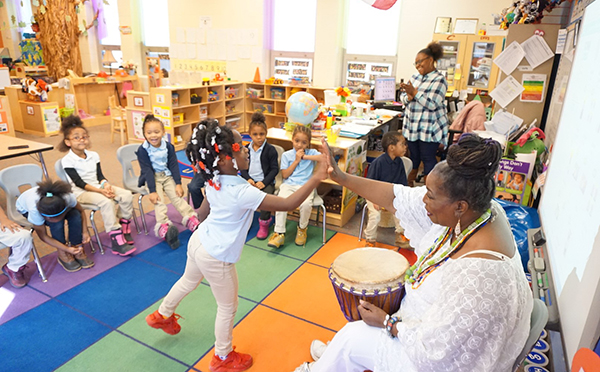- Home
- The MetroHealth Foundation
- Why Give?
- Peer 2 Peer Mental Health Awareness Group
Donor Stories: Peer-2-Peer Mental Health Awareness Group
School Health Program peer-mentoring program key to one family’s ‘co-destiny’
How “post-traumatic growth” inspired new campaign to reduce mental health stigma in young people

This image of flowers by local artist Jae Capo was created as a collective representation of the art on display at Richmond Heights High School’s Mental Health Art Showcase.
A new peer-support program at a local high school is giving young people the tools to overcome the stigma of mental illness and provide care and connection when friends need it most.
The Peer-2-Peer Mental Health Awareness Group at Richmond Heights High School is a student-led initiative built on the idea that many signs of behavioral health challenges first present themselves during adolescence – and teens are often more likely to listen to other teens than even the most well-meaning adults.
The program grew from a partnership between the School Health Program team and the family of a young adult who lost his life while undergoing treatment for a brain disorder. As his illness progressed, many peers and friends had retreated – not because they lacked compassion, but because like many young people, they may not have had the resources, education and language to see beyond the stigma of mental health to support friends who may be struggling.
In their bereavement, the family sought hope in the idea of co-destiny – the idea that doing good in the name of a person will strengthen the goodness of that person’s legacy. They were motivated to channel their grief through “post-traumatic growth” and find new ways to support other young people who face mental illness. They spoke with several mental health providers throughout the area and a few across the country. Through their conversation with MetroHealth’s School Health Program, they met Lisa Ramirez, PhD, Director, Community and Behavioral Health. Dr. Ramirez, they said, “just got it. She got us.”
They knew MetroHealth was the perfect partner to support a peer initiative.
“We wanted to honor the family’s experience and vision through a model that felt authentic to young people,” said Katie Davis Bellamy, Executive Director, Community & Corporate Health at MetroHealth. “Not everyone needs clinical behavioral health treatment, but there is evidence that efforts to normalize mental illness and reduce its stigma can make young people more willing to seek help for themselves or others.”
The search for best practices led the team to the Eisenberg Family Depression Center at the University of Michigan, which launched the Peer-to-Peer Depression Awareness Campaign in 2009 and provides implementation and facilitation support for more than 57 programs nationwide.
Survey results for other University of Michigan P2P programs have consistently shown positive school-wide gains where students are more likely to seek help for symptoms, more comfortable discussing mental health issues with friends, and more confident in their ability to identify common signs of depression and help others access services.
MetroHealth P2P Project Coordinator Jessica Vazquez works onsite at Richmond Heights High. Through the fall of 2023, she supported faculty mentors and partners from the University of Michigan to train a small group of P2P student mentors in mental health awareness, core messages, myths, symptoms and approaches.
Equipped with this foundational information, student leaders designed an awareness campaign based on their own knowledge of their school environment and their peers. The P2P framework is intentionally student-led and adult-supported, so young people can create an experience unique to themselves and the approximately 450 students at Richmond Heights.
“It has been such a great experience for everyone involved,” said Jessica. “The students feel empowered in designing their own program, already coming up with things to do differently next year. Staff are finding new opportunities to connect with students differently, and we are even hearing from some parents who have seen positive behavior changes in their child.”
Throughout the spring semester, peer mentors implemented their P2P campaign messages – “Mental health is a journey, not a destination; Talk, Listen, End the Stigma” – through lunch-and-learn activities, morning announcements, social media campaigns and ongoing conversations with classmates and friends. Earlier this month, the P2P program held a Mental Health Art Showcase to close out the school year.
End-of-year surveys at Richmond Heights will be compared to surveys administered at the start of the program to understand if and how students’ perspective on mental health and stigma may have changed.
By supporting the P2P initiative, the donor said, they hope to reach more teens and families by slowly introducing the program at a handful of schools in the future. They hope to see the program implemented so it provides ever-growing networks with resources that their lost loved one didn’t have.
“This is what feels right to us,” they said. “This carries forward the idea of co-destiny – that he continues to inspire goodness in the world, not just for us, but for generations of young people and their communities.”
Your Generosity Means a Healthier Greater Cleveland
Support MetroHealth in its commitment to care for all.
Give to MetroHealth Today
